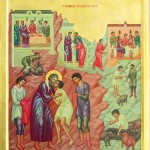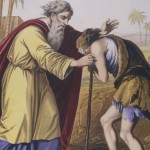On February 16, on the Sunday of Prodigal Son we had a celebration in our temple. St. George’s Rector, Archpriest Igor Tarasov served the Divine Liturgy. Following the Scripture lessons he preached a sermon:
“On today’s Sunday the Church desires to teach us about true repentance telling us the parable about the Prodigal Son. Before our further reflection on it, let us make clear that in the English language the word “prodigal” means someone “lavish”, some spendthrift. In Slavonic, as well as in the Orthodox tradition the son from today’s Gospel parable is called “bludnyj” which means “dissolute”, a person engaging in lust, fornication or immoral life. This is why today’s Epistle lesson is discussing the sins of flesh. St. Paul teaches us today saying, “The body is not for fornication, but for the Lord; and the Lord for the body” (1 Cor. 6, 13).
“There is a great interest in the body in today’s world. Jogging, sports, healthy diet, going to the gym – all these is very popular. Even here, near our church, around the corner there is a gym where many people come. Very often they park right here, near the temple and take the parking spots which could be used by our parishioners. They are not interested in the church, but in keeping their bodies in shape. People spent a lot of time and money to keep their bodies healthy. Yet at the same time people do a lot to degrade their bodies. There is loose behavior, lustful desires, pornography, encouragement of sex. In addition, there is alcohol, smoking and drugs. Very often the same people who join health clubs and go on crash diets are dissipating themselves in other ways, degrading their bodies, the very bodies they are trying to preserve. On one hand, the body is being exalted, but on the other hand, it is being exploited, manipulated and played with. One of the reasons for this is that people have lost sight of God Who created the body. We need some kind of ‘theology of the body’. And this is what St. Paul gives us in today’s Epistle reading. He restores our vision of God and of what God means to the human body.”
“First of all, St. Paul tells us that the body is not meant for fornication, for immoral life, but for the Lord (1 Cor. 6, 13). The body was created by God, and God could not mean it to be used for low and dirty affairs. On the contrary, God designed the body to be glorified, to be in paradise with Him. Even when we lost the paradise, we were redeemed by our Lord who now gives us a great opportunity to join the Creator in eternal blessedness, join Him along with our body which will be resurrected on the last day. This very body, in which we now live, will be raised to spend eternity with God. Expecting that glorious day we need to serve the Lord not only with our mind and heart, but with the total person which includes the body. Every human person consists of body and soul. And thus the body is very important.”
“Secondly, St. Paul says that the Lord is for the body (1 Cor. 6, 13). This means that when our Lord died for our salvation, that salvation affects both our souls and bodies. The body of a Christian is sacred. It is a temple of the Holy Spirit (1 Cor. 6, 19). And, as we said, the Lord will raise it on the last day.”
“Keeping all this in mind, we could be asking, along with St. Paul, whether we are allowed to take our body which was created by God and exists for the Lord, and give it to some unworthy use? Could we take the body, this temple of the Holy Spirit, and yield it, surrender it, to the immoral, sinful purpose? Asking this question St. Paul fervently utters: “Do you not know that your bodies are members of Christ? Shall I then take the members of Christ and make them members of a harlot? Certainly not!” (1 Cor. 6, 15). He also instructs that in any intimate act we become one body with another person. If we get married God blesses such intimacy. But if we fornicate, we become one body with a sinful person (1 Cor. 6, 6, 16). Being Christians, we are already joined to Christ. Therefore, if we become one body with a sinner, we destroy this union with Christ and establish a union with Satan. This is why St. Paul stresses that the sins of flesh are against our own body, not only against our soul. And urges us to flee fornication (1 Cor. 6, 18).”
“Dear brothers and sisters! St. Paul in today’s Epistle reminds us that we were bought with a great price (1 Cor. 6, 20), meaning that the Son of God paid for our salvation by His own life, by His own blood. Thus, our body belongs to Him. Far from belonging to us, the body is God’s temple and must be kept holy for Him. Therefore, let us avoid the sins of flesh. Let us be careful in our behavior, our thoughts, our words, our looks, our actions. Let us avoid the fate of the Prodigal Son from today’s Gospel parable. He took the inheritance and spent it with the harlots, in the lustful life. He converted and returned to his father, but it cost him a lot. He paid a great price. Our Lord paid a price for us, so we can easily stay with Him. Therefore, according to the words of St. Paul, let us glorify God in our body and in our sprit! (1 Cor. 6, 20).”
After the Liturgy Fr. Igor expressed his gratitude to those parishioners who attended the church these two days (yesterday and today) despite the inclement weather and to those who helped to keep the church clean and warm.


